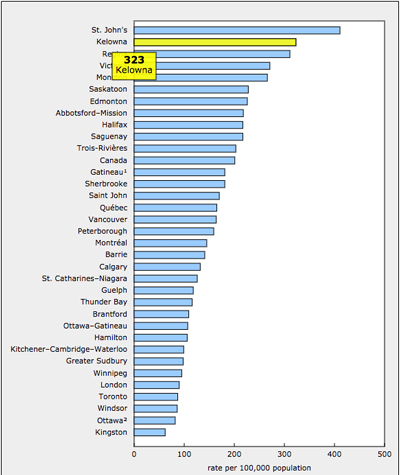
(JOHN MCDONALD / iNFOnews.ca)
December 14, 2016 - 1:04 PM
KELOWNA - The Interior’s largest city is once again in the crime spotlight courtesy of Statistics Canada, this time being singled out as home to the second-highest rate of drunk drivers per capita among major urban centres across the country in 2015.
In a report out today, Stats Can identified Kelowna as having 323 impaired driving incident per 100,000 population, second only to St. John’s with 441 and just higher than Regina at 311.
But the bare stats themselves may not tell the entire story. Impaired driving is fairly unique in the Criminal Code of Canada. Crimes like break-ins, assaults, thefts, fraud and other crimes are often initiated by complaints reported to police. These impaired driving stats are police-reported incidents driven almost exclusively from police initiative: Counterattack, roadside campaigns and accident investigations confirming impaired driving.
Kelowna RCMP spokesperson Cpl. Jesse O’Donaghey couldn’t say if the detachment or traffic services section focussed more closely on impaired driving in 2015, but says it’s always a priority.
“High numbers reflect the ongoing and proactive efforts,” O’Donaghey says. “Enforcement is ongoing throughout the calendar year. We will continue with that strong enforcement as we move forward."
It may be more accurate to say these stats on impaired driving don’t show Kelowna, or any other city, has more or fewer drunk drivers than others — it’s an indicator of law enforcement initiative. Police in Kelowna took more impaired drivers off the road.  But how police in British Columbia get those drivers off the road is also significant because impaired driving has largely been decriminalized. Since 2010, police have begun to rely heavily on provincial traffic laws that empower them to give immediate roadside prohibitions and the ability to seize vehicles instead of proceeding with criminal charges which can result in jail times and real prosecutions.
But how police in British Columbia get those drivers off the road is also significant because impaired driving has largely been decriminalized. Since 2010, police have begun to rely heavily on provincial traffic laws that empower them to give immediate roadside prohibitions and the ability to seize vehicles instead of proceeding with criminal charges which can result in jail times and real prosecutions.
The Stats Can report says in 2015, 70 per cent of ‘impaired driving incidents’ garnered criminal charges across the country, down from 9 out of 10 in 1989.
But in B.C., that number falls to 27 per cent of impaired driving incidents cleared by criminal charges as of 2011, the latest stats available. That means fewer than 3 in 10 impaired drivers are charged with crimes. This is one example.
The Kelowna numbers are also likely skewed by its tourism numbers — the population at any given time can be much higher than census figures show.
That Kelowna still remains near the top of the list, however, is still cold comfort.
“It is disturbing that drivers continue to make the decision to drive after drinking,” O’Donaghey says. “We hope this information from Stats Canada will prevent someone from making that tragic decision to pick up their keys and drive."
He also notes that police rely on and encourage members of the public to report suspected drunk drivers whenever possible.
OTHER KEY FACTS ABOUT IMPAIRED DRIVING IN CANADA
MORE IMPAIRED DRIVING IN RURAL AREAS
• 7/10 Canadians live in urban areas, but account for only half the impaired driving incidents
TRY NOT TO DRIVE AFTER 11 P.M.
• Half of all impaired driving incidents are discovered between 11 p.m. and 4 a.m.
MOSTLY MEN
• 80 per cent of impaired drivers are men, but overall that number is decreasing. The number of women implicated in impaired driving incidents is up to 20 per cent from just 8 per cent in 1986, though that’s largely because decreases in numbers of men have driven up the percentage.
TEAMS THAT PLAY TOGETHER…
• are more likely to drive home impaired than the average person (7.3 per cent compared to 3.9 per cent of 'inactive individuals'). Golfers, skiers and snowboarders, fishers and bowlers are also more likely to drive while impaired.
To contact a reporter for this story, email Marshall Jones or call 250-718-2724 or email the editor. You can also submit photos, videos or news tips to the newsroom and be entered to win a monthly prize draw.
We welcome your comments and opinions on our stories but play nice. We won't censor or delete comments unless they contain off-topic statements or links, unnecessary vulgarity, false facts, spam or obviously fake profiles. If you have any concerns about what you see in comments, email the editor in the link above.
News from © iNFOnews, 2016